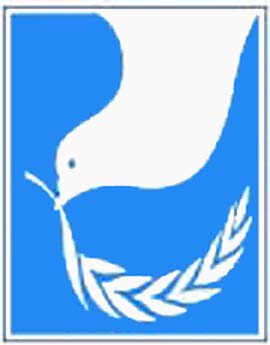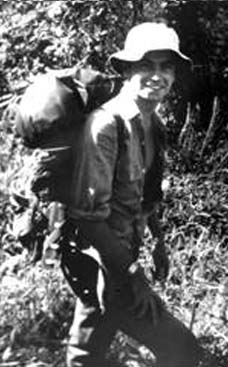
Young Evalyn Katz met a budding poet named Karl Shapiro just before he was drafted into the Army in 1941. While World War II raged, she exchanged numerous letters with Shapiro, who was stationed in Australia and New Guinea. He sent her poems describing his conscripted life and his love for her, and she refined them and worked to get them published. In 1965, she and Shapiro divorced, and soon afterward she moved to Washington and began working for the Peace Corps.
PCOL Comment: Karl Shapiro was a Pulitzer Prize winning Poet who was born and raised about a block from where PCOL makes his home in Reservoir Hill in Baltimore.
Obituary for Staff Member Evalyn Katz Shapiro
Evalyn Katz Shapiro, 89; Edited Prized War Poems
By Yvonne Shinhoster Lamb
Washington Post Staff Writer
Friday, December 14, 2007; Page B07
Evalyn Katz Shapiro, who edited and promoted her fianc¿e's haunting wartime poetry, which won the Pulitzer Prize in 1945, died of a heart attack Nov. 18 at Inova Alexandria Hospital. Mrs. Shapiro, a retired librarian, was 89 and lived in Alexandria.
Young Evalyn Katz met a budding poet named Karl Shapiro just before he was drafted into the Army in 1941. While World War II raged, she exchanged numerous letters with Shapiro, who was stationed in Australia and New Guinea. He sent her poems describing his conscripted life and his love for her, and she refined them and worked to get them published.
Her persistence in knocking on the doors of magazine and book publishers yielded success. Shapiro, the soldier-poet, published three books and was awarded the Pulitzer Prize for his "V-Letter and Other Poems" in 1945.
That same year, the two married in Baltimore's Belvedere Hotel.
Diederik Oostdijk, a Dutch researcher who wrote last year about the wartime success of Shapiro's poetry, credited Mrs. Shapiro with directing his career. Oostdijk noted "the air of romance and patriotism that clung" to the couple.
"She ensured that his poems wound up in major magazines, such as The New Yorker, Poetry, and Partisan Review, and convinced Reynal & Hitchcock -- a small but respected publishing house in New York -- to print three of Shapiro's books during World War II," Oostdijk wrote in a Dutch journal. "She was instrumental in getting Shapiro a Guggenheim Fellowship and edited, compiled, and arranged Shapiro's poems in 'Person, Place and Thing' (1942) and 'V-Letter' . . . .
ad_icon
"In his voluminous correspondence with Katz, he calls 'V-Letter' 'our book,' " Oostdijk recounted. "When 'V-Letter' won the Pulitzer Prize in 1945, the victory was as much for her as for him."
Mrs. Shapiro continued to edit her husband's poetry through the mid-1950s.
"Evalyn helped him as a critic improve his poems," said Jane Meyers, a longtime friend and colleague at the Library of Congress, where Mrs. Shapiro worked for many years. "She was absolutely one of the most brilliant, literary people. You never heard her put two words together without them being in the most original way."
Mrs. Shapiro was born June 20, 1918, in Lancaster, Pa., the daughter of a Russian immigrant who had served in the Duma, or Russian parliament, and later was involved in labor organizations in the United States. Her mother worked in a cigar factory. As a youngster, she spent summers with an aunt who ran an orphanage in Philadelphia.
After high school, she made her way to Baltimore, where she worked at Stone's Bakery and, a friend recalled, met Shapiro, a Baltimore native, in a bookstore.
After Shapiro left for the Army, the two corresponded almost daily when he was stationed in Virginia and then when he went overseas. In 1942, she moved to New York, where she found work as a receptionist in a Park Avenue doctor's office.
For the next two years, she also took on the role of dogged literary agent.
After her husband returned from the war, he became consultant in poetry, or what is now called poet laureate, for the Library of Congress from 1946 to 1947. He left that post to join Poetry magazine in Chicago as editor, and Mrs. Shapiro worked as managing editor. She helped organize the magazine's finances, solicited advertisements and read poetry manuscripts.
Mrs. Shapiro enjoyed the literary life that brought her into the company of legendary poets such as T.S. Elliot, Stephen Spender and Robert Frost.
A mother of three, she soon devoted herself to raising her children as she followed her husband's teaching career to Nebraska and back to Chicago. In Nebraska, she taught cooking. "She was an amazing cook," Meyers said. "It was like being friends with Julia Child."
In 1965, she and Shapiro divorced, and soon afterward she moved to Washington and began working for the Peace Corps.
Mrs. Shapiro joined the Library of Congress and later spent 20 years, from 1969 to 1989, in the Division of the Blind and Handicapped. She helped select books to be recorded or translated into Braille.
"Her expertise was poetry," recalled Frank Kurt Cylke, director of the what is now the National Library Service for the Blind and Physically Handicapped. "She had a lifelong love of poetry."
Colleagues knew her as a "wonderful character" who loved to laugh, a "life force" who didn't allow difficult circumstances to keep her down, a "very intellectual person" who was forward-looking.
She loved being surrounded by beauty, said Meyers, and refused to use computers because she found nothing beautiful about them.
A daughter, Elizabeth Shapiro Brey, died in 1993.
Survivors include two children, Katharine Shapiro of New Delhi and John Jacob Shapiro of Arlington County; three grandchildren; and a great-granddaughter.













